Do you ever feel nervous near water, or wonder, “What are the benefits of learning to swim?” Swim lessons can reduce drowning risk by 88 percent, even when started at just four months old.
In this post you’ll learn how swimming boosts your physical health, eases stress and anxiety, and opens doors to lifelong recreation. Read on to discover ten perks that could change your life for good.
Key Takeaways
Starting swim lessons as early as four months old can lower drowning risk by an impressive 88%—a huge safety boost for young kids.
Regular swimming helps reduce blood pressure in people with mild hypertension, dropping readings by around 6 mmHg.
Exercise in water delivers about 12-14% greater resistance compared to workouts on land, helping build muscle strength without extra pressure on joints.
Top-level swimmers burn as many as 1,000 calories each hour during intense training sessions—great news if calorie burning is your goal.
In Taiwan, a study with 101 swimmers found noticeable stress relief right after their swimming sessions, highlighting swimming as an effective stress-buster.
Table of Contents
Physical Health Benefits of Learning to Swim

Swimming works your entire body from head to toe without harsh impact on your joints. Your heart and lungs get stronger with each lap, making this water sport one of the best ways to stay fit.
Improves Cardiovascular Health
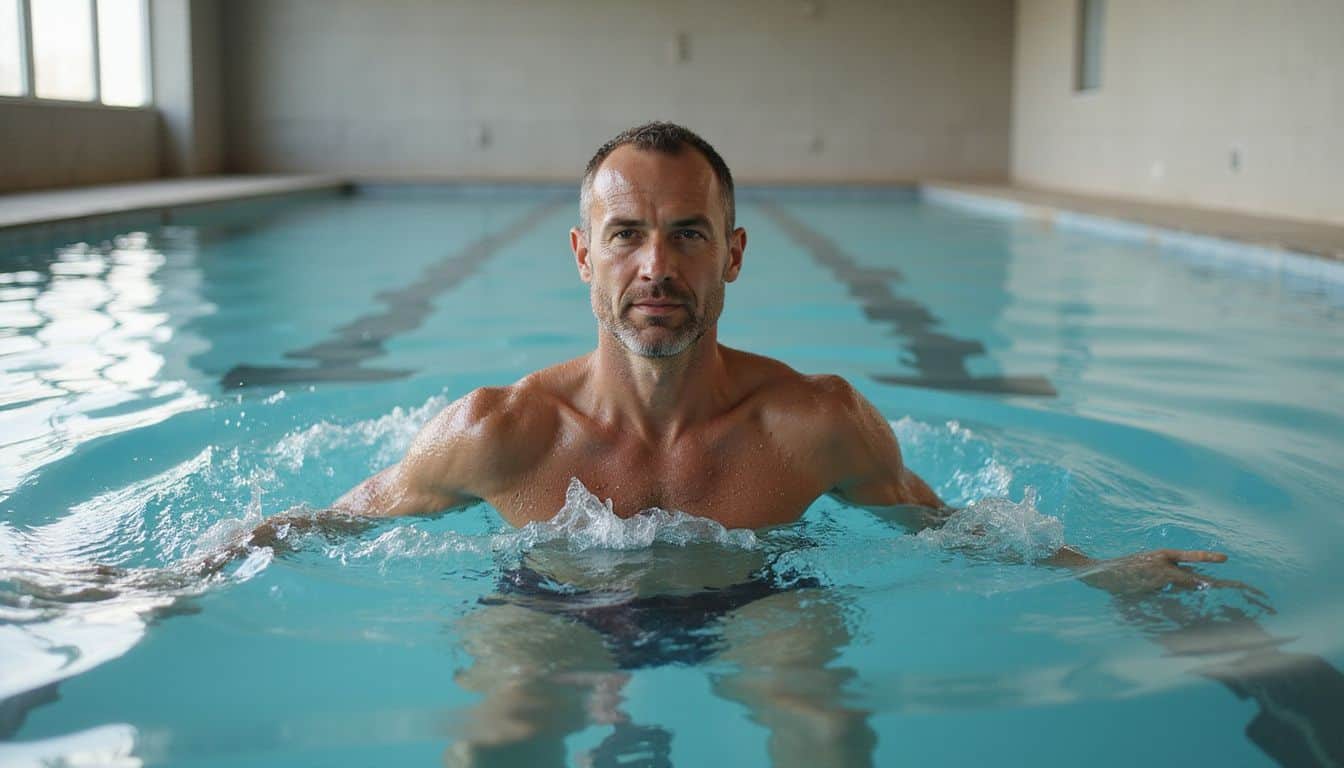
Doing laps in the pool gives your heart an intense workout. With each stroke, your heart beats harder to deliver blood to active muscles. That extra effort gradually makes your heart healthier and stronger.
Research confirms this: high-intensity swim workouts lower blood pressure by 6 mmHg for people with mild hypertension. Even moderate swim routines drop blood pressure by about 4 mmHg in only 15 weeks.
Plus, regular swimmers’ resting heart rates fall by roughly 5 beats per minute, meaning their hearts run smoothly with less effort.
The water resistance in swimming creates a perfect environment for cardiovascular training without the impact stress of land-based exercises.
I’ve noticed these improvements myself in our swim group. Many friends who joined our early morning swims started off with low endurance—but now they easily swim longer distances without losing their breath.
The Centers for Disease Control and Prevention confirms this advantage, noting water-based workouts greatly improve heart performance in men of all ages. Spending regular time in the pool builds stronger hearts and lungs, setting the stage for better lifelong health.
For anyone wanting cardio benefits minus joint strain, swimming at public pools or joining swimming in schools programs provides a perfect option.
Builds Muscle Strength and Endurance
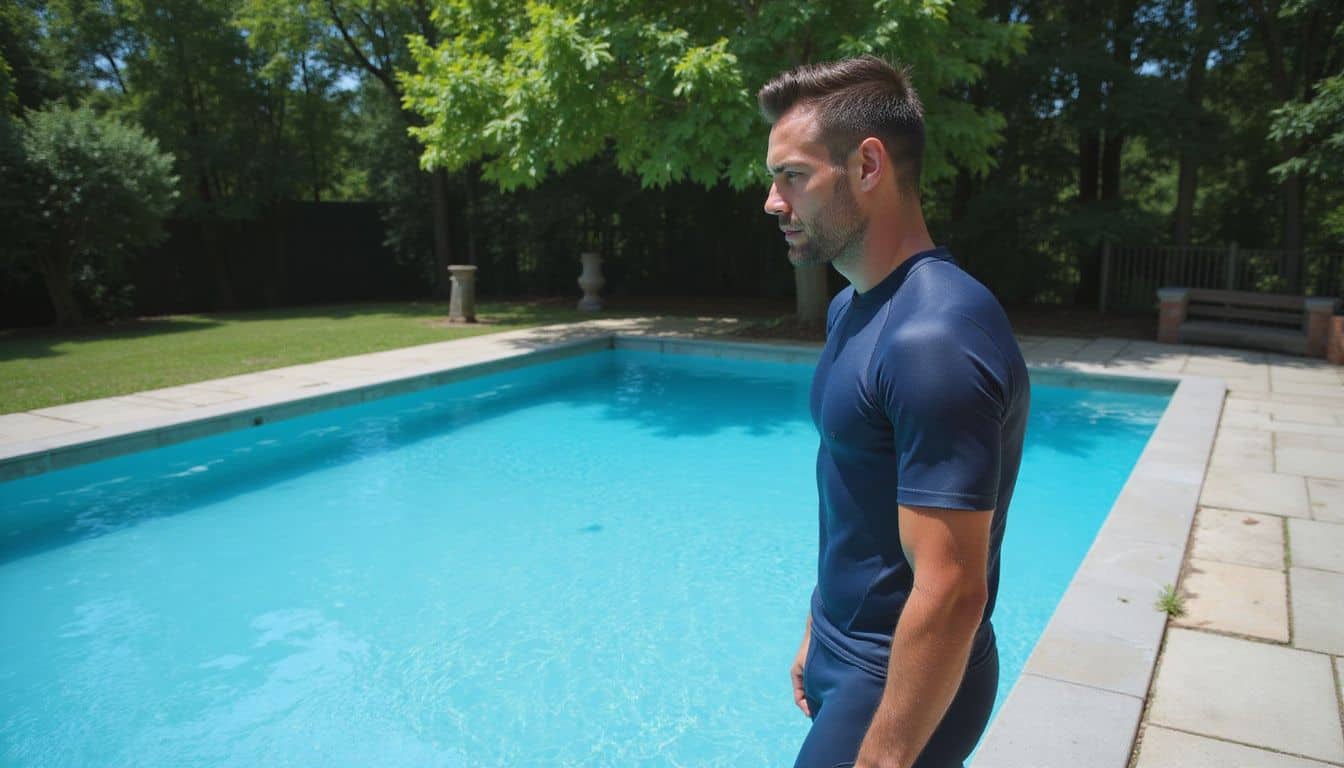
Swimming gives your whole body an amazing workout with every stroke. Your arms pull through the water, your legs kick, and your core muscles hold steady—all at the same time. This complete exercise activates every major muscle group, adding about 12-14% extra resistance compared to land-based workouts.
Men who swim often see more defined muscles, without the usual joint stress from regular weightlifting. I started swimming three times a week last year; after just two months, I noticed clearer definition in my back and shoulders.
Since water naturally pushes back against your movements, your muscles must work harder and end up stronger, with greater endurance.
Elite swimmers can burn as many as 1,000 calories each hour during tough training sessions. Plus, different swim strokes help develop specific muscle areas. Freestyle strengthens shoulders, backstroke focuses on your back muscles, and butterfly targets your chest.
Because water provides steady, gentle resistance, it’s an ideal space for building strength, boosting fitness levels, and even reducing the risk of chronic illnesses.
Enhances Flexibility and Coordination

Men who start swimming regularly get big benefits for their bodies. The water supports your joints, giving you space to stretch and move freely, boosting overall flexibility. Your muscles push against the water’s gentle resistance, building strength that makes everyday movements easier and smoother.
This good hobby for men to try provides a workout for almost every muscle group at one time—something few sports on land can match.
Arms pull, legs kick, and your core muscles tighten, creating a balanced full-body workout, and helping you stay stable and balanced on your feet.
The abilities developed in the pool carry over into your daily routine, too. Improved posture comes naturally, as swimming builds core strength. Plenty of guys report feeling taller and more graceful after just a few weeks of regular swims.
The combination of arm and leg movements teaches your body and brain to communicate better. These new coordination skills transfer neatly into every area—playing sports, tackling tasks at work, climbing stairs easily, or lifting heavy boxes.
Timing your breathing with each stroke sharpens coordination even more, training your whole body to function as one smooth unit.
Mental Health Benefits of Learning to Swim

Swimming helps your mind as much as your body. The water’s gentle embrace can wash away stress and build a stronger mental state.
Reduces Stress and Anxiety

Men deal with stress daily—from work deadlines to family duties, it all adds up. Swimming can be a great stress reliever. In fact, a survey in Taiwan involving 101 swimmers found their stress dropped significantly after swim sessions.
Your body releases endorphins while swimming, and these natural chemicals bring calmness and happiness. Endorphins produced in water workouts can lower anxiety more effectively than other forms of exercise.
Water has a way of washing away the day’s tensions that nothing else can match.
Exercising in water helps your body manage stress more easily than workouts on land. The steady rhythm of your strokes and your breathing creates a peaceful, meditative effect. Even better, colder water and outdoor swims offer extra mental health benefits.
Many men who swim often report improved sleep, helping to reduce anxiety even further. Make swimming a valuable part of your mental health routine—it’s simple, enjoyable, and it works.
Boosts Mood and Confidence
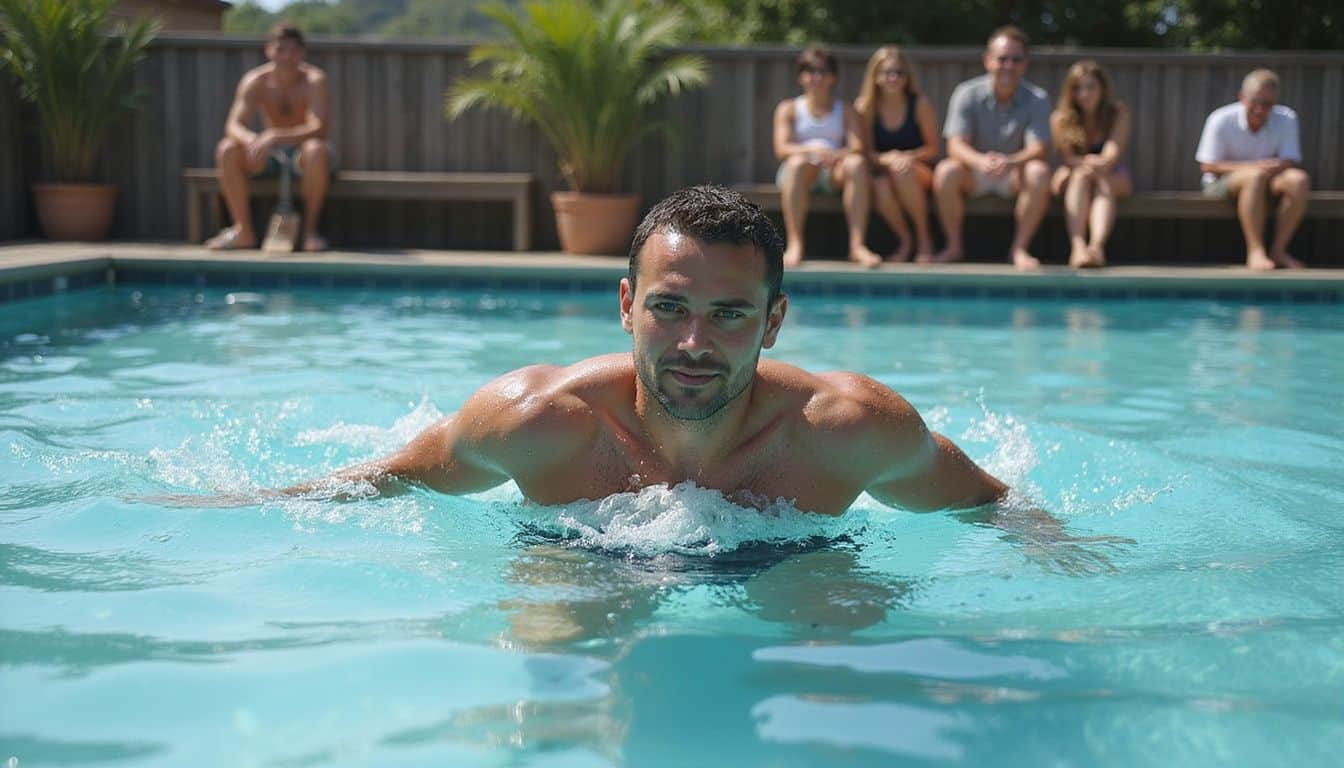
Swimming does more than ease stress: it boosts your mood with a rush of endorphins. That satisfaction you get after a strong swim session isn’t imaginary—it comes straight from your brain.
These natural ‘feel-good’ chemicals flood your system, creating that happy wave many dedicated swimmers swear by. I felt this myself, noticing clear changes after just two weeks of regular pool visits.
My outlook brightened, daily tasks seemed easier, and challenges felt less overwhelming.
For men, swimming offers a powerful confidence boost. Mastering new strokes and completing longer distances bring clear, tangible rewards that lift self-esteem. The pool environment encourages physical success and better body awareness.
Sport psychologists commonly highlight swimming as a great tool for building self-assurance, offering clear ways to track your improvement. Plus, social ties formed at local pools or swim clubs often become supportive, motivating communities, helping swimmers grow steadily and feel good about themselves.
Improves Sleep Quality

Guys who swim regularly often enjoy better rest at night. Research shows consistent time in the pool lets you fall asleep sooner—and sleep more deeply. Swimming sessions give your body a solid workout, tiring muscles naturally, prepping them for rest.
Water resistance causes physical exhaustion, signaling your brain clearly that it’s bedtime. Lots of men struggling with sleep issues found swimming more helpful than using pills or sleep aids.
Even older men battling insomnia noted big improvements once they made swimming a habit. This cardio-focused exercise gets your blood flowing and eases stress—two major benefits for beating insomnia.
The steady breathing pattern you use during laps can also quiet a busy mind, helping shut down racing thoughts before bed. Now, let’s look at another benefit: swimming builds water-safety skills that could even save your life.
Practical Life Benefits of Learning to Swim

Swimming gives you skills that help in many parts of life, from staying safe in water to making friends at pools and beaches, and you’ll find these benefits grow with each stroke you master.
Teaches Essential Water Safety Skills
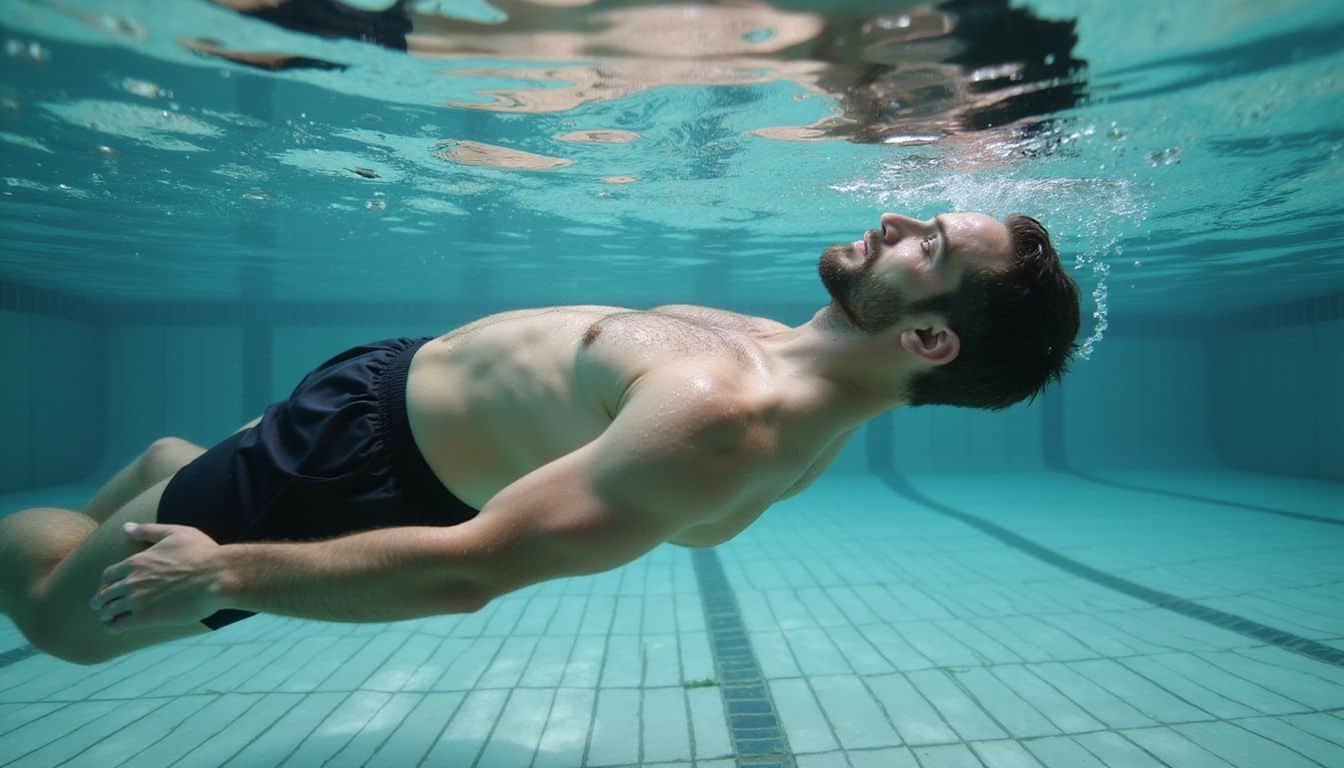
Knowing how to swim gives you essential skills that could save your life—or someone else’s. Lessons show you ways to float safely, spot hazards, and respond if trouble strikes. Learning these methods greatly lowers the chance of drowning.
You’ll get familiar with basics like floating on your back, breathing correctly, and treading water. To build on these techniques, Goldfish Swim School offers free virtual classes and downloadable W.A.T.E.R.
safety guides through YouTube.
Men who master water safety skills can relax more, and worry less, during outdoor activities. You’ll figure out how to quickly check water depths, notice rip currents, and assist anyone needing help.
That kind of know-how boosts your confidence, making water outings fun instead of stressful. Once you know how to handle the unexpected, enjoying lakes, pools, and oceans becomes second nature.
Your skills will shine during fishing trips, family beach days, or even trying new water sports—making every adventure safer and more enjoyable.
Opens Opportunities for Water-Based Activities

Mastering water safety skills opens a whole new set of exciting adventures. Being able to swim lets you easily explore sports like surfing, kayaking, or even water polo. Lots of guys find that beach vacations or lake trips feel more relaxed—and way more fun—once they’re confident swimmers.
You can comfortably join your friends jet skiing or give stand-up paddleboarding a try, without stress or worry.
Swimming also unlocks plenty of other hobbies out on the water. Your confidence in the water lets you snorkel peacefully around colorful coral reefs or scuba dive to discover amazing underwater scenery.
Fishing trips on boats become safer and way more enjoyable, letting you freely explore different spots out on the lake or ocean. Improved swim skills also mean you can join team-based water activities—which can boost your friendships and social skills.
Many guys find water sports provide both solo excitement and the chance to bond with others, boosting their fitness while creating lasting memories.
Supports Lifelong Fitness and Recreation
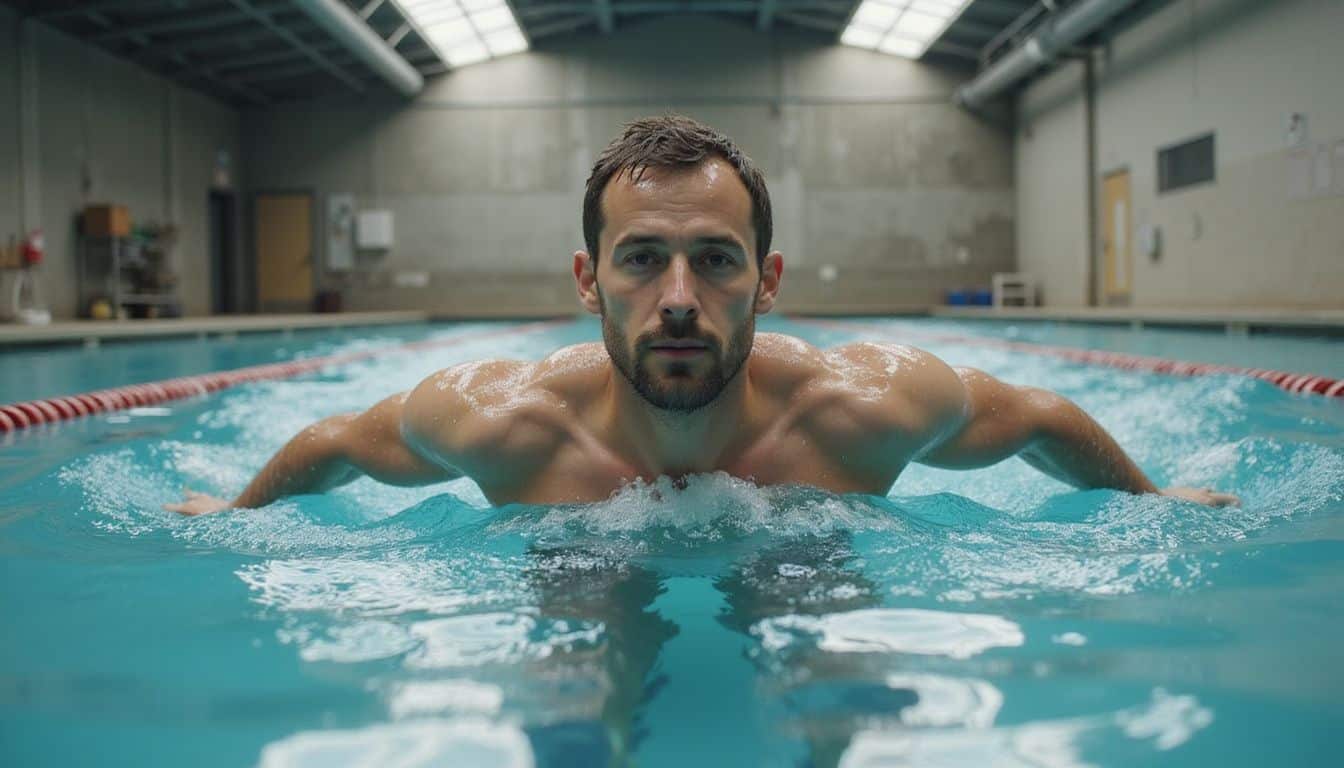
Swimming gives men an ideal way to stay fit for life. While high-impact sports like running can get tough on joints as you age, swimming stays gentle and effective—and still packs a punch.
Public swimming pools and local swim clubs make it simple to get regular workouts. You’ll build muscle strength without adding strain to your body. As men get older, they often swap out harder activities, like jogging, for swimming to avoid joint pain.
Plus, swimming delivers an effective full-body workout, boosting heart health and strength to help prevent chronic disease.
Being a capable swimmer also opens up plenty of enjoyable water hobbies for years to come. Mastering the basic swim strokes gives men the confidence they need to enjoy activities like snorkeling, surfing, or boating.
Knowing how to swim well makes family vacations more interesting and lets you engage fully in family adventures. Men who swim regularly stay active later into life, often joining adult swimming groups or indoor pools to keep up exercise year-round.
The easygoing pace of water-based workouts protects sore or aging joints, yet still delivers impressive fitness results. Because of all these perks, swimming makes a smart lifelong exercise option for men seeking lasting physical health.
How Will the Benefits of Learning to Swim Evolve in 2025?
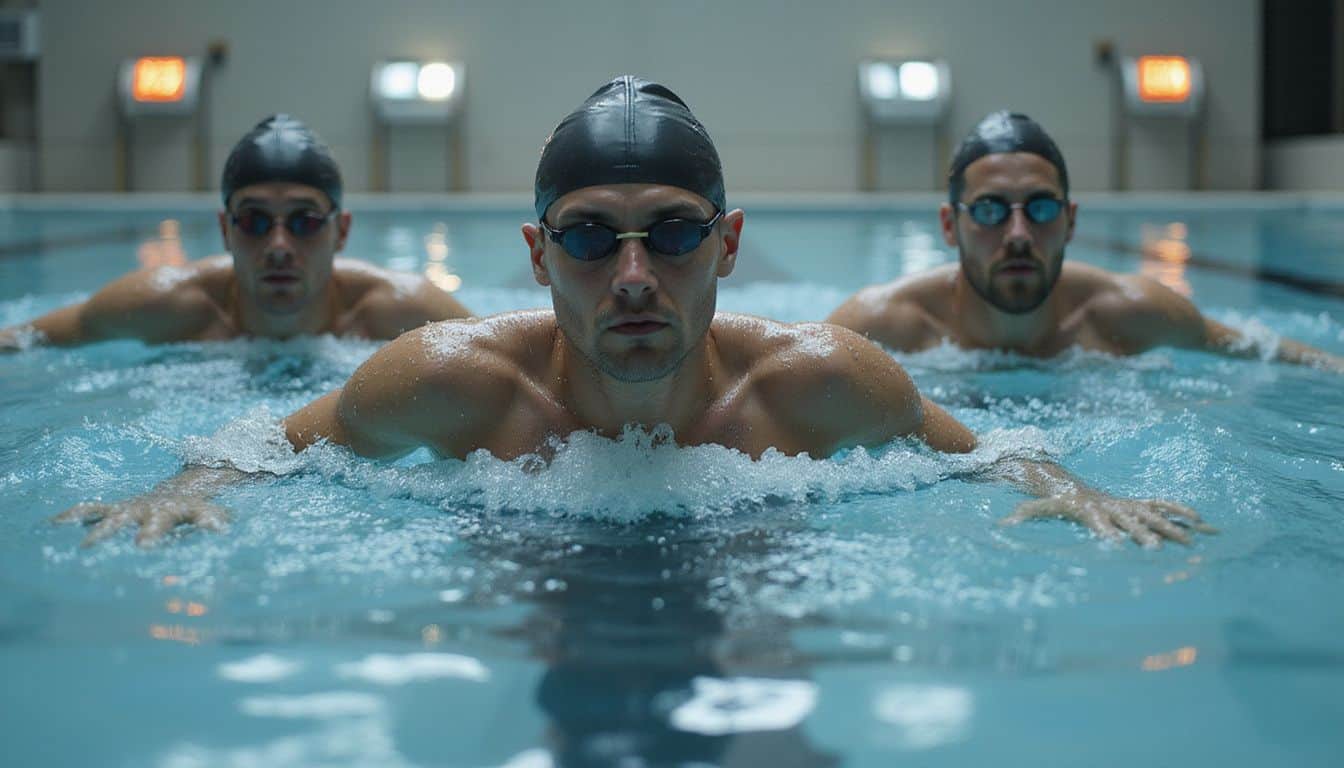
By 2025, swimming will likely gain recognition as a top fitness choice for men. New studies are expected to highlight clear connections between regular swimming routines and improved heart health.
This makes swimming a popular option for guys trying to dodge chronic diseases. The gentle impact of water workouts will also become especially appealing as men grow older. Water-based exercises protect joints while still helping build muscle strength and increasing lung power.
Health insurers might even start offering lower premiums for those who enroll in swim sessions, encouraged by long-term health savings and fewer medical bills.
Tech innovations will soon change the way men learn swimming and keep tabs on their progress. Smart goggles, fitted with heads-up displays, will instantly show stroke technique and heart rates.
Virtual reality setups might even let swimmers practice their breaststroke form—or train alongside digital coaches—without getting wet. Such advanced gadgets will draw tech-savvy men who enjoy fitness tracking and data-driven progress.
The social side of swimming is also set to expand. Adult swim teams and water workout groups will become common, boosting confidence and improving overall health.
People Also Ask
How does swimming help prevent drowning?
Swimming lessons teach adults and kids essential water survival skills. These lessons build confidence, show techniques for safety, and improve reaction during emergencies. Learning these lifesaving skills greatly lowers drowning risks.
Can swimming improve my mental health?
Absolutely! Swimming helps fight anxiety, stress, and even depression by releasing chemicals that lift your mood. Sports psychologists often suggest swimming to clear your head and ease mental tension. Plus, the steady movements in swimming can quiet a busy mind.
Is swimming good for people with joint problems?
Swimming is ideal if you have joint pain, arthritis, or similar issues. It offers gentle exercise without heavy pressure on joints. Water supports your body, giving relief, while gently working your muscles.
How does swimming compare to other forms of exercise?
Swimming engages more muscle groups than activities like cycling or lifting weights. It strengthens muscles, boosts lungs, and improves blood flow—all at once. You get strength training and cardio wrapped into one swimming workout.
Is swimming safe during pregnancy?
Swimming is among the safest exercises you can choose while pregnant. Water naturally supports your growing body, easing strain and discomfort. Just steer clear of overly hot pools or hot tubs, since high temperatures could raise the chances of early labor.
Can swimming help children beyond physical fitness?
Swimming helps kids develop better motor skills, coordination, and even academic focus. Regular swimming practice encourages discipline, supports a positive attitude, and promotes healthy habits. It also builds kids’ confidence, helping them grow in other areas of life.
References
- https://pmc.ncbi.nlm.nih.gov/articles/PMC4000940
- https://blog.myswimpro.com/2019/11/13/10-health-benefits-of-swimming/ (2019-11-13)
- https://www.healthline.com/health/benefits-of-swimming
- https://www.betterhealth.vic.gov.au/health/healthyliving/swimming-health-benefits
- https://www.bupa.co.uk/newsroom/ourviews/benefits-of-swimming
- https://www.usms.org/Articles%20and%20Videos
- https://vasatrainer.com/blog/10-science-backed-benefits-of-swimming-for-your-body-mind/
- https://www.whitefishwave.com/2021/10/10-benefits-of-swim-lessons-for-kids/ (2021-10-18)
- https://www.kidscanswimcanada.ca/what-are-the-benefits-of-learn-to-swim-lessons/ (2025-01-18)
- https://momish.com/benefits-of-learning-to-swim/ (2022-03-28)


